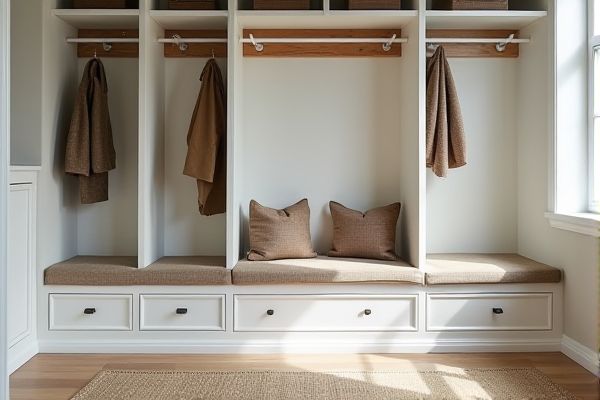
A cubby bench offers open compartments ideal for easy access and organization of shoes or small items, while a drawer bench provides concealed storage, helping maintain a clutter-free space. Discover which option best suits Your home's style and storage needs by reading the rest of the article.
Table of Comparison
| Feature | Cubby Bench | Drawer Bench |
|---|---|---|
| Design | Open compartments (cubbies) | Enclosed pull-out drawers |
| Storage Type | Visible, segmented storage | Hidden, organized storage |
| Accessibility | Easy and quick access | Retractable, requires pulling drawers |
| Use Cases | Shoe storage, display items | Clutter concealment, small item storage |
| Maintenance | Requires regular cleaning of open cubbies | Drawers protect contents from dust |
| Visual Appeal | Allows decorative presentations | Clean, streamlined look |
| Space Efficiency | Good for organizing multiple items | Maximizes storage within compact space |
Introduction to Cubby Benches and Drawer Benches
Cubby benches provide open storage compartments ideal for organizing shoes, bags, and small items, making them perfect for entryways or mudrooms. Drawer benches offer enclosed storage with pull-out drawers, ensuring a tidier appearance and protection from dust while keeping essentials easily accessible. Choosing between a cubby bench or drawer bench depends on your storage needs and the level of accessibility you prefer.
Key Design Differences
Cubby benches feature open compartments ideal for easy access and display, while drawer benches offer enclosed storage that keeps items hidden and protected. The design of cubby benches supports organization through visible, segmented spaces, contrasting with drawer benches that provide a sleek, seamless appearance by concealing clutter. Your choice between these styles depends on whether you prioritize accessibility and visibility or a clean, minimalist look.
Storage Capacity Comparison
Cubby benches offer open compartments ideal for easy access and versatile storage of shoes, bags, or decor, maximizing visibility and organization. Drawer benches provide enclosed storage, protecting items from dust and offering a higher capacity for storing smaller belongings in a more discreet manner. Your choice depends on whether you prioritize accessible, airy storage or secure, hidden compartments to optimize your space.
Aesthetic Appeal and Style Options
Cubby benches offer an open, airy aesthetic that emphasizes casual organization and accessibility, making them ideal for modern and farmhouse styles. Drawer benches provide a sleek, streamlined look with hidden storage, complementing contemporary, minimalist, and traditional interiors. Both options enhance entryways or bedrooms, but choosing between visible cubbies or concealed drawers depends on the desired blend of functionality and visual appeal.
Accessibility and Organization
Cubby benches offer open compartments that provide easy access and quick visibility, ideal for organizing shoes or frequently used items without the need to open drawers. Drawer benches, on the other hand, enhance organization by concealing clutter within smooth-sliding drawers, keeping your space tidy and protected from dust. Your choice between the two depends on whether you prioritize immediate accessibility or streamlined, hidden storage.
Space-Saving Advantages
Cubby benches offer superior space-saving advantages by providing open compartments for easy storage and quick access, making them ideal for entryways or small rooms. Drawer benches maximize space efficiency by utilizing enclosed storage that keeps items organized and out of sight, perfect for clutter reduction in compact areas. Both options enhance functionality and optimize limited floor space, but cubby benches excel in visibility while drawer benches prioritize concealed storage.
Durability and Material Choices
Cubby benches often feature open compartments made from sturdy woods like oak or maple, providing durable storage ideal for heavier items and high-traffic areas. Drawer benches typically use solid wood or engineered wood with metal glides, ensuring smooth operation and longevity, but may wear faster under constant heavy use due to moving parts. Material choices such as hardwoods and quality hardware critically influence the durability and lifespan of both cubby and drawer benches in residential or commercial settings.
Maintenance and Cleaning
Cubby benches offer open compartments that allow for easy dust removal and quick access during routine cleaning, while drawer benches often require pulling out drawers to thoroughly clean hidden dust and debris. Drawer benches may trap dirt in corners and tracks, necessitating more detailed maintenance to prevent buildup and ensure smooth operation. Choosing the right bench influences how efficiently you maintain your seating or storage area, helping You keep your space clean with minimal effort.
Ideal Use Cases for Each Bench
Cubby benches excel in entryways and mudrooms by providing open storage for shoes, bags, and frequently used items, facilitating quick access and organization. Drawer benches are ideal for bedrooms and living rooms where concealed storage is preferred for items like clothing, accessories, or remote controls, maintaining a clean and clutter-free appearance. Both bench types enhance seating solutions while catering to different storage needs based on room function and user preference.
Final Verdict: Which Bench Suits Your Needs?
A cubby bench offers open storage ideal for easy access and displaying items, making it perfect for entryways or playrooms where organization and visibility matter. Drawer benches provide concealed storage, enhancing a tidy look and protecting belongings from dust, suited for bedrooms or living areas requiring a streamlined appearance. Choosing between a cubby bench and a drawer bench depends on your priority for open versus hidden storage and the specific area where the bench will be used.
 homyna.com
homyna.com